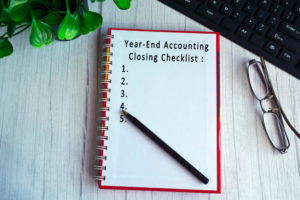Year-End Bookkeeping Considerations
As 2022 comes to an end, businesses across the country will work diligently to close out their books so that tax returns can be filed on time and to have insight into the year’s performance. If you’re like most business owners, you’re probably juggling end-of-year accounting procedures in addition to heavier traffic and sales and payroll tasks. So instead of scrambling to get your year-end processes completed, use this as a guide to organize the way you wrap up your year.
Gather and Analyze Financial Statements
Your financial statements are a lifeline for your small business. They tell you where your business stands financially and forecast your business’s financial future and plan for the new year. So before the year ends, gather all your accounting records and use them to compile and analyze your year-end statements. While you want to gather as much financial information as you can, there are three financial statements that you should have handy:
- Income statement
- Cash flow statement
- Balance sheet
Collect Past-Due Invoices
If you want to wrap up your books for year-end, try to collect money that customers owe to your business. That way, your business can start the new year on a positive note. Some options for collecting past-due invoices include:
- Setting invoice payment terms (i.e., due dates)
- Documenting the payment process
- Contacting customers with due invoices via phone or email
- Establishing a payment plan with customers.
If none of these methods work or you can’t collect the money yourself, consider hiring outside help. Collection agencies can help you collect past-due invoices for a price.
Account for Inventory
Be sure to keep track of materials and supplies you have on your hands if your business has inventory. Otherwise, you can end up with empty shelves or inventory shrinkage. The end of the year is a great time to look over your inventory since it will help you analyze how much you spent on inventory during the and its value. Additionally, it can help you better plan next year’s inventory.
Organize Business Receipts
Before the end of the year, make it a point to organize all your business receipts. Disorganized business receipts leave room for sloppy and inaccurate bookkeeping, as well as errors on your business tax return. So to organize your business receipts, try doing the following:
- Sorting receipts by type of expense
- Using folders and labels
- Organizing receipts in chronological order
- Storing receipts digitally on your computer
Get Necessary Documents Ready for Your Accountant
If you use an accountant or accounting software for your business, you need to get documents ready for your accountant and/or accounting software. While the type of documents you will need will vary depending on your type of business and your accountant, the most common documents businesses need for their year-end accounting are:
- Financial statements
- Bank and credit card statements
- Petty cash records
- Invoices and receipts
- Sales records
- Payroll records
- Loan information
Year-End Accounting Services from CFO Source
CFO Source is a full-service accounting and Quickbooks firm. We’ve been helping business owners for the past 20 years with their accounting needs and can help you have a successful year-end. Contact us today to get started.



 Click to View the Areas That We Serve
Click to View the Areas That We Serve 



